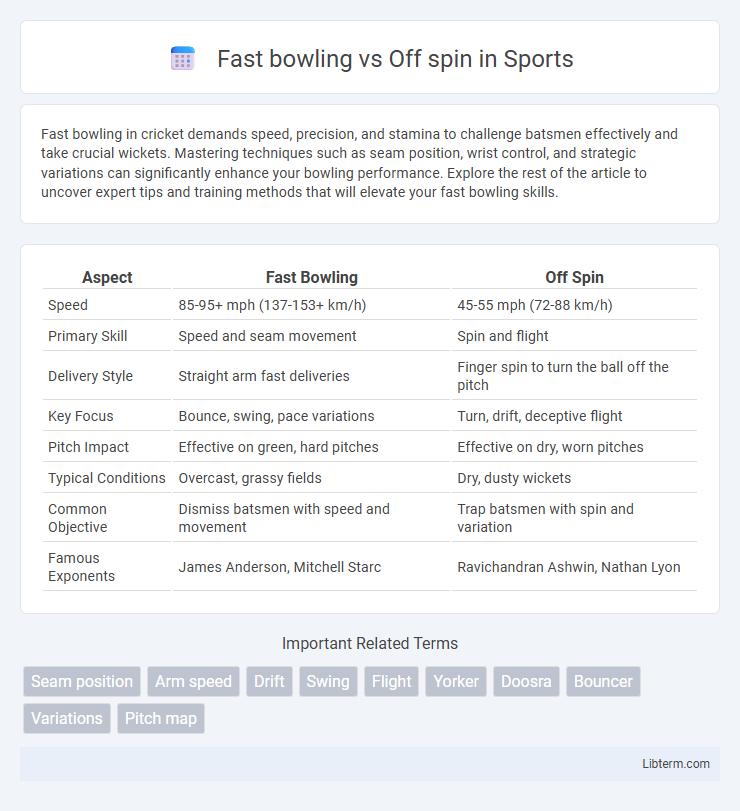Fast bowling in cricket demands speed, precision, and stamina to challenge batsmen effectively and take crucial wickets. Mastering techniques such as seam position, wrist control, and strategic variations can significantly enhance your bowling performance. Explore the rest of the article to uncover expert tips and training methods that will elevate your fast bowling skills.
Table of Comparison
| Aspect | Fast Bowling | Off Spin |
|---|---|---|
| Speed | 85-95+ mph (137-153+ km/h) | 45-55 mph (72-88 km/h) |
| Primary Skill | Speed and seam movement | Spin and flight |
| Delivery Style | Straight arm fast deliveries | Finger spin to turn the ball off the pitch |
| Key Focus | Bounce, swing, pace variations | Turn, drift, deceptive flight |
| Pitch Impact | Effective on green, hard pitches | Effective on dry, worn pitches |
| Typical Conditions | Overcast, grassy fields | Dry, dusty wickets |
| Common Objective | Dismiss batsmen with speed and movement | Trap batsmen with spin and variation |
| Famous Exponents | James Anderson, Mitchell Starc | Ravichandran Ashwin, Nathan Lyon |
Introduction to Fast Bowling and Off Spin
Fast bowling relies on high-speed deliveries exceeding 140 km/h, aiming to challenge batsmen with pace, seam movement, and swing. Off spin involves slower, finger-spun deliveries that curve from the off side to the leg side, exploiting pitch conditions to deceive batsmen. Both bowling styles demand distinct techniques, physical attributes, and strategic approaches to outwit opponents in cricket.
Key Differences Between Fast Bowling and Off Spin
Fast bowling relies on high-speed deliveries, often exceeding 85 mph, using seam position and swing to trouble batsmen, whereas off spin focuses on slower, spinning deliveries that turn from the off side to the leg side for a right-handed batsman. Fast bowlers use pace, bounce, and seam movement to generate wickets, while off spinners exploit flight, dip, and turn to deceive batsmen and induce mistakes. The physical demands and tactical roles differ, with fast bowlers requiring strength and endurance for sustained speed, and off spinners emphasizing control, variation, and subtle spin techniques.
Techniques Involved in Fast Bowling
Fast bowling relies on a powerful run-up, dynamic wrist and finger position, and explosive arm action to generate high ball speed and seam movement. The bowler's body biomechanics emphasize strength, balance, and precise release point to achieve bounce and swing, making it challenging for batsmen. In contrast, off spin involves a slower delivery with finger rotation to impart spin and deceive the batsman through trajectory and turn rather than sheer pace.
Techniques Involved in Off Spin Bowling
Off spin bowling relies on finger rotation to impart spin on the ball, causing it to turn from the off side to the leg side of a right-handed batsman. The bowler uses a slight wrist flick combined with a controlled delivery stride to enhance accuracy and spin consistency. Maintaining a high arm action and varying flight and speed are crucial techniques to deceive batsmen and induce errors.
Physical Demands: Fast Bowlers vs Off Spinners
Fast bowlers experience intense physical demands due to explosive sprinting, powerful arm rotations, and high-impact landings, leading to increased risk of muscle fatigue and injuries such as stress fractures. Off spinners endure lower physical stress, emphasizing finger dexterity, spin control, and repetitive arm motions that cause strain primarily in the fingers, wrists, and forearm muscles. The energy systems utilized differ, with fast bowlers relying heavily on anaerobic power and cardiovascular endurance, while off spinners depend more on fine motor skills and muscular endurance with less overall physical exertion.
Tactical Approaches: Speed vs Deception
Fast bowling relies on speed and bounce to unsettle batsmen, forcing quick reactions and defensive shots. Off spin prioritizes deception through flight, turn, and subtle variations, aiming to outfox the batsman by inducing mistakes. Tactical use of fast bowling applies pressure through pace and short deliveries, while off spin exploits the pitch's turn and uses changes in trajectory to lure batsmen into false shots.
Effectiveness in Different Pitch Conditions
Fast bowling excels on bouncy, hard pitches where pace and bounce challenge batsmen, generating edges and mistimed shots. Off spin thrives on dry, cracked surfaces that offer turn and grip, exploiting footwork weaknesses and inducing errors. Both bowling styles adapt their effectiveness based on pitch moisture, hardness, and wear, influencing match strategies and player selection.
Impact on Batters: Facing Pace vs Spin
Facing fast bowling challenges batters with high-speed deliveries that demand quick reflexes and precise shot selection under pressure. Off spin bowling, with its slower pace and pronounced turn, forces batters to read the spin and adjust their footwork and timing meticulously. The contrast in pace and movement between fast bowling and off spin significantly impacts batter strategy, often dictating different techniques and risk assessments during an innings.
Notable Fast Bowlers and Off Spinners in Cricket History
Notable fast bowlers in cricket history include Willie Merson, Dennis Lillee, and Glenn McGrath, renowned for their pace, swing, and relentless accuracy. Legendary off spinners such as Muttiah Muralitharan, Saqlain Mushtaq, and Ravichandran Ashwin have been celebrated for their variations in spin, flight, and ability to deceive batsmen. Both bowling styles have shaped the tactical complexity of cricket, with fast bowling relying on speed and bounce, while off spin emphasizes subtlety and turn.
Choosing Between Fast Bowling and Off Spin
Choosing between fast bowling and off spin depends on pitch conditions, team composition, and bowler skills; fast bowling excels on bouncy, fast pitches by generating pace and bounce, while off spin thrives on turning tracks offering flight and spin variations. Fast bowlers require strength and speed for sustained short bursts, whereas off spinners rely on finger dexterity, control, and subtle variations to deceive batsmen. Balancing these attributes optimizes bowling strategies, enhancing wicket-taking opportunities throughout different match scenarios.
Fast bowling Infographic

 libterm.com
libterm.com